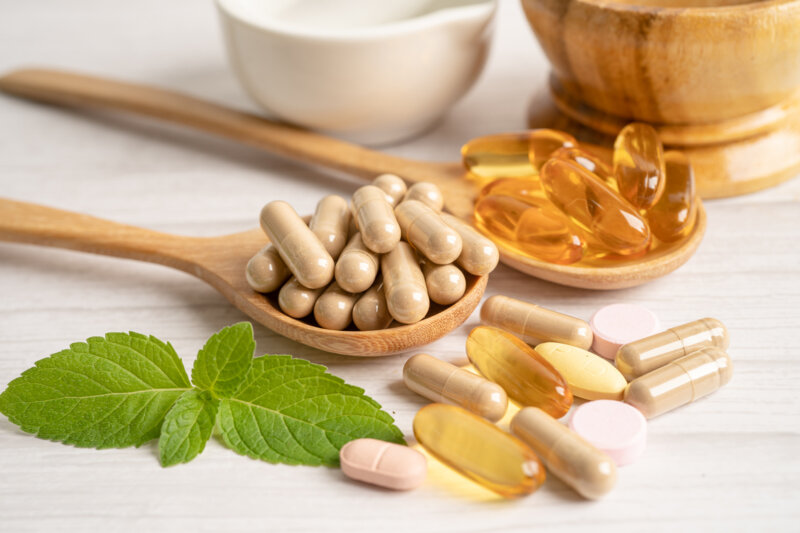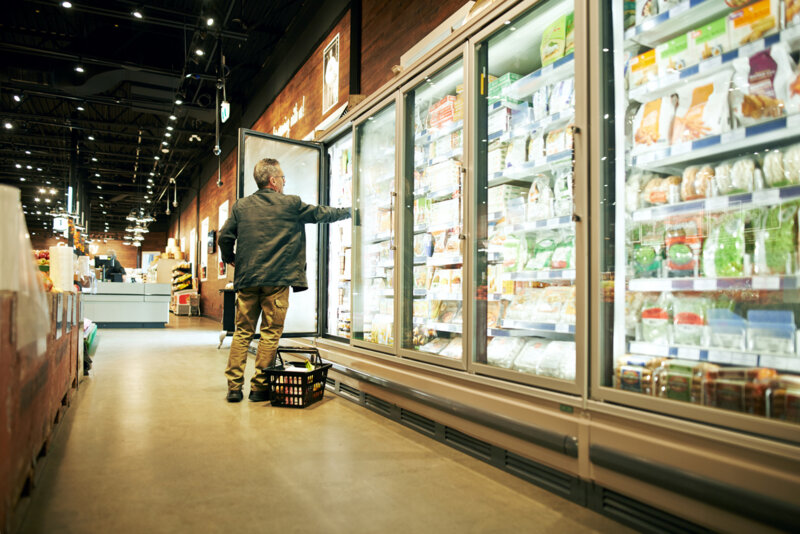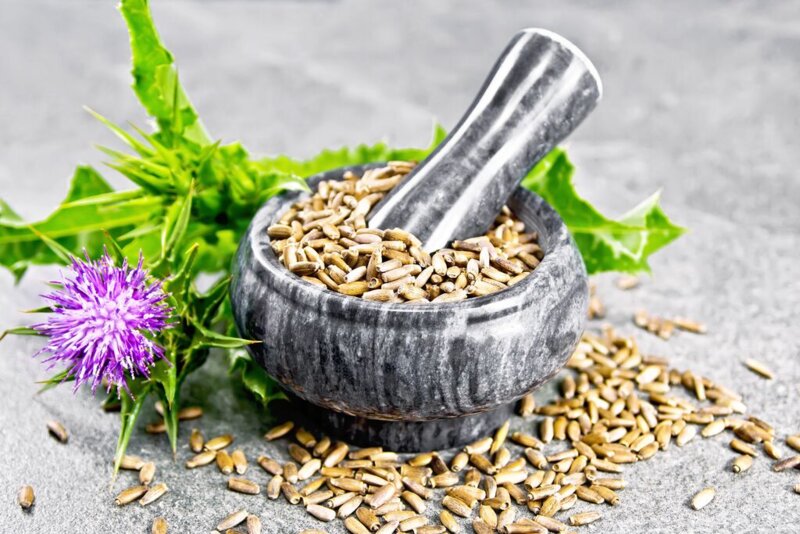- Soya beans 450 mg
- Cashew nuts 450 mg
- Peanuts 320 mg
- Tuna 300 mg
Happy food – food that makes us happy

Our food not only provides us with energy and vital nutrients. It can also make us happier. This is because there are certain foods that can boost the body's own production of serotonin, the happiness hormone. We show you the best mood-enhancing foods and explain which vital substances can have a positive effect on a well-functioning nervous system.
Serotonin: the happiness hormone with multiple tasks
Serotonin is a messenger substance, or more precisely a neurotransmitter. It is involved in many functions and processes in the body. The transmission of information in our nervous system is one of serotonin's most important tasks. The neurotransmitter is also significantly involved in regulating our mood. Serotonin promotes calmness and tranquillity. For this reason, it is also known as the happiness hormone.
Serotonin also plays a role in regulating body temperature, the sleep-wake rhythm and the feeling of appetite and satiety, among other things. The neurotransmitter is also involved in blood clotting and memory performance.
Body needs L-tryptophan for serotonin production
There are foods that contain serotonin. For example, kiwis, pineapples, plums, tomatoes and bananas. These fruits are therefore often considered lucky foods. But there is a problem: the serotonin in these foods does not reach the brain. The so-called blood-brain barrier acts like a bouncer that serotonin cannot get past.
But there is a loophole. In order for our brain to produce serotonin, it needs the amino acid L-tryptophan. Coupled to insulin, the amino acid gets past the bouncers of the blood-brain barrier. With the help of vitamin B6 , niacin and magnesium, our brain then converts L-tryptophan into a precursor of serotonin (5-hydroxytryptophan), from which the happiness hormone is ultimately formed1 . This is where mood-enhancing foods come into play. They contain the amino acid L-tryptophan (colloquially just tryptophan).
Foods high in tryptophan
The amino acid tryptophan is one of the essential amino acids. This means that our body cannot produce it itself and we have to ingest it through our diet. Food groups containing tryptophan include, above all, those with a lot of protein:
- Cheese
- Meat / Fish
- Pulses
- Nuts
- Wholemeal products
- Eggs
Good to know: The recommended daily intake of the amino acid for adults is 4-5 mg tryptophan per kilogramme of body weight3 .
Carbohydrates promote serotonin production
In order for the amino acid tryptophan to pass through the blood-brain barrier, it needs a transport molecule: insulin. Our body produces insulin primarily when we eat carbohydrates. For example, rice, pasta, potatoes and bread. The ideal happy meal therefore not only consists of foods containing tryptophan, but also always contains a certain amount of carbohydrates.
Ideally, these are so-called complex carbohydrates, such as those found in wholemeal products. In contrast to simple carbohydrates (sugar, white flour products), they contain more nutrients and fibre and are also a source of tryptophan.
Other important vital substances for the nervous system
The transmission of information in the nervous system is an important task in which serotonin is involved. We can support a well-functioning nervous system with certain vital substances.
Curcumin
Curcumin can promote nerve regeneration4 . This active ingredient is found naturally in the turmeric root. Curcumin is also contained in turmeric spice mixtures, but only around five per cent on average.
Coenzyme Q10
Coenzyme Q10 has an antioxidant effect and plays a role in supplying energy to the body's cells - including nerve cells.5 We can obtain certain amounts of Q10 from foods such as poultry, liver, fish, eggs and butter.
L-carnitine
L-carnitine plays a crucial role in the energy balance and energy metabolism.6 Nerve cells in particular require a lot of energy, which means that a good supply of L-carnitine can be beneficial for the nervous system. L-carnitine is also mainly found in animal foods such as meat, cheese and milk.
These factors can make the absorption of vital substances more difficult
Ideally, we manage to take in sufficient quantities of all the important vital substances for the nervous system through our diet. In theory, this is possible. However, there are some factors that can make this more difficult in practice.
- Coenzyme Q10 and L-carnitine, for example, are only found in large quantities in animal foods. However, we should not consume these in excessive quantities as part of a healthy, balanced diet. Vegan people even avoid them altogether, vegetarians to a certain extent.
- Certain medications or illnesses can also have a negative effect on the nutrient supply. Impaired kidney function, for example, can lead to more L-carnitine being excreted in the urine.7
- Statins (cholesterol-lowering drugs), on the other hand, can have a negative effect on Q10 production.8
- In order to benefit from the health effects of curcumin, unrealistically high amounts of the turmeric spice would have to be consumed.
If you want to specifically support your nervous system, you can take dietary supplements containing the vital substances curcumin, coenzyme Q10 and L-carnitine.
Our conclusion on the topic of happiness food
Serotonin is an important neurotransmitter and ensures that information is transported from one nerve cell to another. The neurotransmitter also influences our mood and is therefore also known as the happiness hormone. We can support the body's own production of serotonin with the right diet - with foods that are rich in L-tryptophan.
The amino acid L-tryptophan is converted into serotonin in the brain. By the way: there are also foods containing serotonin. However, we do not benefit from serotonin as it does not reach the brain. The so-called blood-brain barrier is an insurmountable barrier for the happiness hormone. It has to be produced directly in the brain.
There are other vital substances that we can benefit from to provide additional support for the nervous system. Curcumin can promote nerve regeneration and coenzyme Q10 and L-carnitine play a role in supplying energy to the nerve cells.
Foods high in tryptophan.
- Chicken 280 mg
- Lentils 250 mg
- Wheat bran 250 mg
- Eggs 230 mg
(content per 100g/source2)
Sources
1) https://flexikon.doccheck.com/de/Serotonin
2) https://www.vitalstoff-lexikon.de/Aminosaeuren/Tryptophan/Lebensmittel.html
3) https://www.bfr.bund.de/de/gesundheitliche_bewertung_von_aminosaeuren-54420.html
4) https://www.mdpi.com/1422-0067/22/9/4666
5) https://www.frontiersin.org/journals/neuroscience/articles/10.3389/fnins.2023.1188839/full
6) https://www.peirsoncenter.com/uploads/6/0/5/5/6055321/a4d2746ef1909af723f4473f9f0f54542e65.pdf
7) https://www.thieme-connect.de/products/ejournals/html/10.1055/s-0032-1332764
8) https://www.thieme-connect.com/products/ejournals/abstract/10.1055/s-0036-1587442









